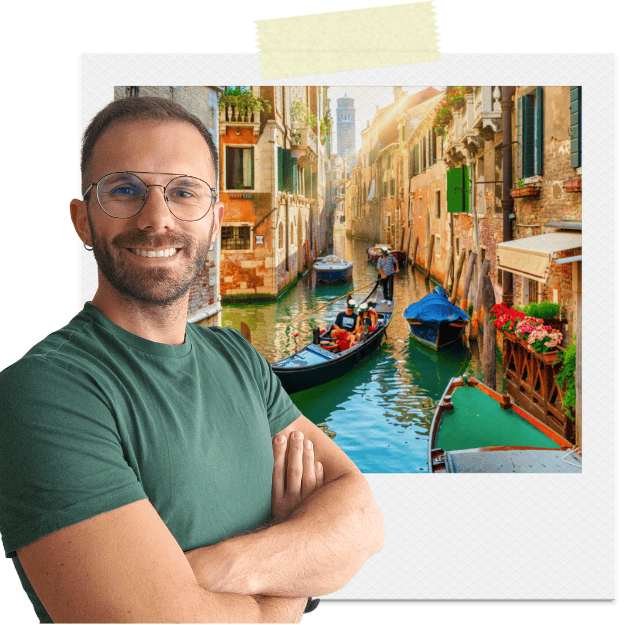Ciao,
I'm Nico
I started working as an Italian teacher in 2016, in private lessons and language schools. While taking my first steps in this world, I improved my teaching skills through studies and courses, until 2020, when I launched my 100% online Italian teaching project: Italiano con Nico.

How I became a 100% online Italian teacher
I was born in a town near Venice in 1991, where I lived until I was 23. From there, for study and work reasons, I started to move around: I went to live in Bologna, then Bristol in England, then back to Italy. Once I finished my university studies, I left Italy with the desire to discover new cultures and learn new languages, which is how I landed in Granada, Spain. There I had my first full immersion in a culture very different from my own, which made me realise that not only could I learn, but I also enjoyed teaching my culture and language to people who had never seen or known anything about Italy.
A couple of years later, I moved to the capital, Madrid. I had already started teaching Italian and had a large number of students, but something was still missing. I wanted to know more people, more languages, listen to more stories, travel and live in other places. It would not have been easy at the beginning, because I only offered face-to-face lessons and relied on language schools, and abandoning everything after a while to start all over again did not allow me to live completely from my job as a teacher. Moreover, I had set aside the languages I had studied at university (English, French, some basics of German and Romanian) to focus on Spanish. I had to find a new perspective.
All these reasons made me think about changing the way I was doing my Italian lessons, i.e., abandoning the face-to-face mode and moving to online teaching. In this way, I could have travelled, moved to other cities or countries without having to start from scratch or abandon my students in the middle of the course, and I could have reached many more people, not only in the country I was in, but all over the world. It took me almost a year to update and adapt my teaching materials, but I finally succeeded and all my efforts gave birth in 2020 to my 100% online Italian teaching project: Italiano con Nico. I couldn’t be happier for the freedom my job gives me and, above all, for the enormous possibility of having students from all over the world: Spain, France, England, Germany, the Czech Republic, Russia, Poland, Portugal, the United States, Mexico, Argentina, Brazil, Australia, South Africa. I have helped dozens of people learn Italian and discover Italy, and they have taught me that despite the differences, we are all much more similar than we think.
My formation
2016
Degree in Modern Languages, Literatures and Cultures (English, French) at the University of Padua with an anthropological research thesis on Contemporary Paganism in the UK.
2017
CEDILS, Certificate in Didactics of Italian to Foreigners at Ca' Foscari University of Venezia.
2018
Master's degree in Literary Translation (from Italian and French into Spanish) at the Complutense University of Madrid with a thesis on Spanish translations of "Una donna" by S. Aleramo.
2019
DITALS II, Certification in Teaching Italian as a Foreign Language at the University for Foreigners of Siena.
2020
Teaching Italian as a Foreign Language project "Italiano con Nico".
2023
Master Degree in Philology, Linguistics and Italian Literature at Ca' Foscari University of Venezia.
As work
During my teaching experience, I have developed my own methodology and therefore I personally create all the content of my lessons, both individual and group.
My lessons are characterised by a mixed approach: while grammar is essential, I always include communicative, written and oral activities, games, listening to videos, exercises and activities to learn vocabulary.